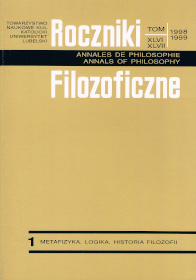The Conception of God in Alfred N. Whitehead’s Metaphysics
Abstract
The paper sought to present the basic elements of the conception of God contained in the writings of Alfred N. Whitehead (1861-1947), the prominent English logician, mathematician and philosopher. The author highlights, among other things, the changes within this conception at the time when Whitehead’s main work Process and Reality (1929) was published, a book that had essentially modified the principal theses of metaphysics contained in his earlier works. The question of the Absolute God had appeared in Whitehead’s writing for the first time in his book Science and the Modern World (three years before Process and Reality). Whitehead’s previous philosophical proposals did not call for an introduction of this kind of problems. In the Science and the Modern World God appears as a Principle of Concretion, determining the range of possibilities which undergo actualization in the real world, an actualization whose absence would be equal to the refutation of reality of the actual being constituting reality. According to this conception, God is „the supreme ground for limitation”, owing to which „the actual course of events which - as regards the non-temporal possibilities (so-called eternal objects) - could be different [...] is just that course”. It constitutes at the same time impersonal Tao, a principle of the rationality of the world ordering events, Platonic Demiurge, shaping the world according to the principles and forms drawn from the sphere of immutable and eternal essences.
The Process and Reality contains an enriched and more complex conception of God whose existence and nature turns out to be a necessary postulate, safeguarding coherence to the „philosophy of organism” proposed by Whitehead. God is not treated here as an „exception towards any metaphysical principles”, but as „their basic exemplification”. Therefore it is taken as the actual being, for only then can He fulfil real functions within a metaphysical system, exemplifying at the same time its basic principles. Similarly as all the remaining elementary components of the universum, God is a being of dipolar character. In His primordial nature - being one of the „poles” of His being - He is identical with the sphere of eternal objects, constituting „the unlimited conceptual realization of the absolute wealth of potentiality”. As such, He does not possess „the highest reality”, is „God in abstraction”, deprived of any relationship with the remaining, concrete, individual and mutable beings. He gains this relationship (the whole of actuality, reality) owing to His consequent nature, in which the primordial influence of the world (the actual beings) on God is brought to effect. God Himself thus made dependent on the mutability of the becoming world, like each actual being, turns out to be a process of the creative development and creation tending to satisfaction. It reveals yet one more aspect of the Divine being - Its superjective nature, within which God highlights the significance of the new possible values and ideals, thereby determining the principal directions of the development of the world. This is done, while respecting fully autonomy and creative spontaneity of other actual beings; God is a „poet of the world who with tender patience leads it by the power of His vision of truth, beauty and good”.
Whitehead’s conception of God is not free from vagueness and inconsequence, a fact that makes it open to various approaches and interpretations. Some of them place it within the perspective of classical theism, others see in it some version of pantheism or pantheism and dynamic monism. Despite that it still inspires some trends of contemporary philosophy and theology (mainly Christian), being an essential challenge for the traditional approaches of classical metaphysics and theodicy.
Copyright (c) 1999 Roczniki Filozoficzne

This work is licensed under a Creative Commons Attribution-NonCommercial-NoDerivatives 4.0 International License.





